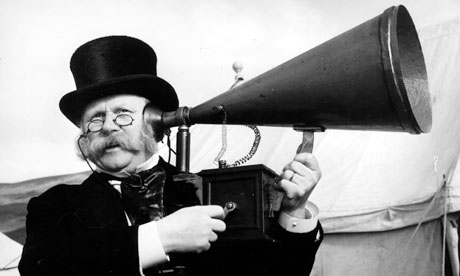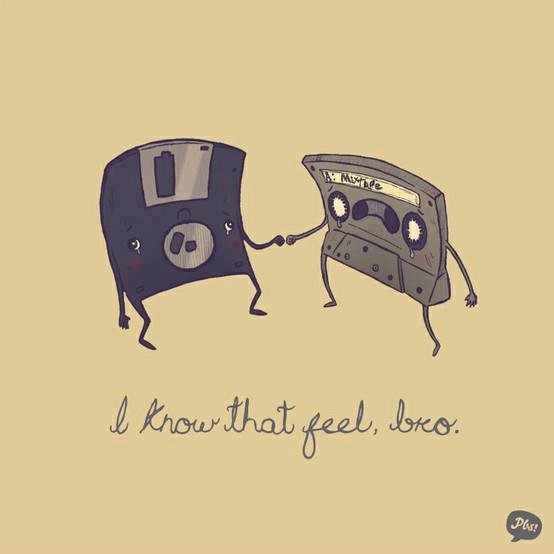ARE YOU SURE YOU ARE LISTENING TO MUSIC?
Lately, I've stumbled upon a couple of posts here on Steemit talking about the importance of listening to music or exploring the idea that one has to KNOW HOW TO LISTEN to music to do it properly. Most of these posts come down to the short explanation of the basic types of listening to music which are mostly described as PASSIVE, ACTIVE or as the various combinations of the two (active-passive, passive active, strong active-weak passive etc.). Although there's nothing ''wrong'' with these posts and I am glad people are writing more and more about it, I share only half of their opinion so I thought I'd also write a post discussing my own views of the subject.

In highschoool, our music class was mostly nonsense. I remember most people being bored to death and the rest just trying to write down the facts they needed to get an A. We'd have to remember useless things like the birth dates of Bach's sons (and thank God he had 7 of them) or the correct way of holding a saxophone without someone ever showing us the exact instrument in real life. In other words, it wasn't much of a music class but rather a class of facts about music and all things music related. People just ended up hating the music class and music in general and it felt just like another history class with bunch of facts ripped out of context to remember. The only test actually involving music was the listening test. The teacher would play a piece of music and we'd have to write down what it was (mostly Mozart, Bach, Tchaikovsky and other well known and instantly recognizable composers and their most famous work). The test sort of worked because everybody would play the composers at home and remembered who the music belonged to without understanding it, but I remember this one time when we were asked to write down the instruments we hear. That's when all hell broke loose. It was Tchaikovsky's famous PIANO concerto 1 in B flat minor. The question was what instruments do you hear at the very beginning? and everybody wrote down PIANO because it was in the name of the piece, although the horns and the timpani were blasting out of the speakers. And that brings us to our problem.
LISTENING ≠ HEARING
The root of our problem already exists in our language.
Here are the definitions by Merriam-Webster:
TO LISTEN :
to pay attention to sound
to hear something with thoughtful attention : give consideration
to be alert to catch an expected sound
TO HEAR :
to perceive or become aware of by the ear
to have the capacity of perceiving sound : to be able to become aware of sound
to gain information
The difference is clear. To hear means to perceive the presence of sound and to then gain information from it which should then lead to listeningor, in other words, paying attention and giving consideration to what we hear. Listening, unlike hearing, involves cognitive activity, giving meaning to what we hear and trying to make sense of it. The problem is hearing mostly doesn't end up with listening. Music is a complex thing. It's probably the most abstract of arts because it feels like it isn't actually there - you cannot touch it, you cannot look at it (you can look at sound waves or written down notes but not the actual music), you cannnot pause it to examine it better because it disappears and it only exists second to second - the only reason you percieve it as music is because your brain remembers what it heard a second ago and expects more in the second to come and then creates a post scriptum version of what it thinks is a ''whole'' on a mental level. This process enables us to play music, analyse it, enjoy it, remember it, to hum along or to be stuck with a song inside our heads for an entire day. Since the distinction between hearing and listening is already obvious, I do not feel PASSIVE LISTENING can exist because listening already presupposes the prefix ACTIVE. In other words, PASSIVE LISTENING is no longer listening but HEARING and active listening is nothing more than what listening should be in the first place. Moreover, when we talk about music, the phrase is usually to LISTEN to music and not to hear music and that means listening (as a thought process) is already assigned to the phenomenon of music. We might say we heard music playing (meaning ''along the way'' but then we say we went over to listen to it (meaning ''to enjoy it and think about it). So, when you put two and two together, it seems people were aware that music has to be listened to (with all the implications behind it) rather than simply heard ever since language first developed.

(the brain at rest can still hear, but it doesn't light up until it starts to listen)
HOW DID WE END UP HEARING INSTEAD OF LISTENING TO MUSIC?
Music was always a live thing. For centuries, people could only enjoy music if it was performed live by other people. Music began as a part of various pagan rituals and slowly transformed into a matter of art. From rituals, music went on to become a huge part of the theatre (and still is today) and then it became an event of its own as concerts and operas developed. No matter what the form was, if you wanted to enjoy music, you had to go to a specific place and you had to be in a specific context and that itself sets up what was expected of you - if you went to a concert, it was expected of you to listen to it because that was the entire point of you going there. The context is the same for everybody attending the show. All of that changed with recorded music. Recorded music gave people the ability to bring their music home rather than enjoying it in public. Music went from a shared event to a private thing and people were now able to play it any time they wanted to in the comfort of their own home. That lead to a change of context and it was no longer expected of you to listen to it - you could play it while you cook or iron or talk with someone on the phone. Music suddenly became a BACKGROUND thing. People started perceiving music as something happening in the background as you go about your daily chores and errands. Music was now something to be heared in the background rather than to be listened to deliberately. As technology progressed, things have gotten worse. Music is now something that is used merely to avoid silence and to make people feel better - it plays in supermarkets to avoid awkward silence, it plays in bars so you don't feel someone can eavesdrop on your private conversation with a friend, it's put in commercials to drag your attention to them and we carry it in our phones to make the bus ride to work less boring. Music became a thing of fun and eliminating boredom. Nobody expects you to listen to music when you shop or drink coffee or watch TV - hearing it is enough. All of that lead to people forgetting what the idea of music was and somewhere along the way we stopped appreciating it because it was now a background thing designed to be ignored. We ended up hearing it instead of listening to it.

(if you think about it, can you imagine what kind of music is playing in the background? Probably, but only vaguely because you're not supposed to remember it.)
SO WHAT IS MUSIC TO US TODAY?
Talking to younger people (such as my cousin and her friends), I've noticed they don't really think about it. To them, music is the same as watching TV or browsing the Internet. They consume it to pass the time, some of them put it on when they study, others like to dance to it in their room and the others don't go much further from ''Oh, I know that song, it's on the radio every day''. To be clear, there's nothing wrong with that and I often do it myself but it seems less and less people are really INTO music. I guess there are many reasons for that (and we've already covered a lot of them) but there's one I always end up coming back to - the demise of format. 20 years ago, you had to wait for an album of your favorite artist to hit the radio and the record stores before you could enjoy it. You had to put an efforit into getting the music, buying it and bringing it home. You'd wait for a new album and maybe get a preview EP in between, you'd buy tickets for the show hoping to hear the new songs live and to sing along to the older hits and so on. I remember sharing terrible sounding pirate tapes of my favorite bands with my friends or coming over to someone's house just because he was the only one with a particular LP records. Today, the effort is minimal. You just go on Youtube (or Deezer or something similar), type in anything you can think of and it just pops out. You can also download almost anything from the Internet and put it in your phone. Again, to be clear, it's a wonderfull thing to have and I appreaciate it a lot because I can now listen to whatever album I want but I wonder how I would feel about it if I didn't spend years eagerly trying to get a hold of my favorite LP that was impossible to buy etc. And it's not just the effort but the demise of format - today, the idea of an LP or an EP is becoming ridiculous. Artists are releasing single after single without ever putting it all into an album. The idea of an album - a complete piece of art with 10+ songs, a cleverly designed front cover, a booklet with the lyrics and pictures in it, something you can hold in your hands as you listen to the record will disappear within the next 15 years or less. This is not necessarily a bad thing but it will further change our idea of what listening and consuming music is. In the end, this already happened with photographs and I'm not sure how many kids born after 2010. will have real, old fashioned picture albums at home - they probably have it safely stored on a cloud.

ARE YOU SURE YOU ARE LISTENING TO MUSIC?
To end up with the title - next time you play your favorite music, try and ask yourself the question - am I sure I'm listening to music? The way to really emerse yourself in music is simple and if you've never really done this before, I strongly recommend you give it a try, it just might change the way you listen to music forever:
Put on your favorite record
sit back and relax
take your time and make sure you don't do anything else
read the lyrics as you listen to the record or go online and read about the album
close your eyes if you feel like it
try to visualize the artist performing the music in your mind
try to feel what you think the artist might have felt recording the album
allow yourself to feel what you feel
try to imagine the instruments
try to recognize al the instruments and sounds you hear
and if you don't recognize something, see what was played in the booklet or online
try to position the sounds in your mind - is the guitar on the left or on the right?
how many guitars do I hear? is this an electric or an acoustic guitar? Is it both playing the same thing?
pay attention to the songs structures
let the atmosphere of the music overwhelm you
In time, you will notice the change in your listening habits. You'll begin to understand and appreciate music on an entirely different and deeper level and you will find that listening to music is an endless experience that is both pleasing and rewarding at the same time, every time.
I hope you enjoyed this post and I hope you'll spend at least an hour today really LISTENING to your favorite record.
Here's my choice for today:
Another great article! BTW, you listened to music in the classroom more then I in high school and primary school. I don't remember any occasion we listened to music. The only thing I remember is ones try to play the flute (one of those small wooden ones) as part of our workshop class, but that is all, 5 minutes of trying and then...next...the boring curriculum.
It is kind of sad that the system is set up like this - a music class with no music in it... And for the flute, we also had to try and do that but it was also a one time thing.
Yeh, agree, art in general shall get more attention in primary school and maybe also in secondary school (in my country no attention at all to art in high/secondary school).